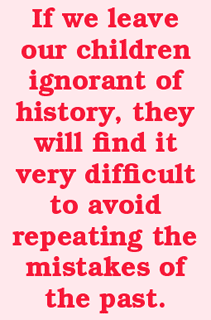As homeschoolers, we practice outcome-based education. We don’t consider
our task to have been successfully accomplished just because the
students survive the year and finish reading most of the textbook. We
don’t consider scoring above the 50th percentile on the social studies
section of the standardized achievement test to be success either.
The ultimate outcome is for our children to develop into godly men and
women. We would like them to serve God with their talents: to always be
ready to share the Word and give a persuasive answer for the hope that
is within them. We think the study of history is useful towards these
ends.

Lives of the Rich and Famous
(and Poor and Famous, Too!)
We want our children to develop godly character and acquire wisdom.
After some months or years of practice, they should be able to, on their
own, examine, analyze, and evaluate the character of a historical figure
using biblical standards.
Using historical biography to teach character and wisdom is certainly
not a 20th century innovation. Rather, this method represents a return
to the traditional study of history.
Neither history nor historians have ever been neutral. History, in the
hands of a God-fearing, truthful, scrupulous historian rises to the
definition of “moral philosophy teaching by example.”
However, all the historical personages your child studies need not be
godly or moral men or women. Many useful lessons can be learned by
applying biblical standards to the choices and actions of someone in
history. We cannot judge the heart (only God can do that), but we can
judge actions—their wisdom or folly, morality or immorality, and their
consequences.
If we train our children to apply biblical thinking in all sorts of
historical situations, they will make the applications in their own
lives. The study of history may not build character all by itself, but
it can certainly reinforce, exercise, solidify, and confirm it.
Who’s In Charge Here?
We want our children to understand God’s view of history, God’s purposes
in history, and God’s involvement in history.
Something of a revival has occurred in the “providential view of
American history.” Writers re-examining American history and emphasizing
God’s involvement deserve applause and appreciation.
We encourage all Christians to broaden their horizon and consider God’s
providential involvement in all of history—American included! By reading
the biblical account of the history of Israel, your children will become
familiar with the pattern by which God acts in history—blessings for
righteous obedience, judgment for lawlessness. Since nations cannot be
judged eternally, God works directly in history to bless or to judge.
Has he done this in American history? Undoubtedly. But more broadly, God
providentially involves himself in the history of all the nations of the
world. We must insure that our children understand this principle so
that they can recognize and proclaim it.
Parents need to examine and scrutinize the selection of books for their
children. Most secular textbooks are governed by an underlying
assumption of the myth of progress—with no acknowledgment of God’s role
in history.
Many profitable books can be used in the study of history, but many of
them need parents to add some perspective, reminder, or recognition of
God’s sovereignty.
The Church and Its Impact on History
Finally, we think it important for our children to understand the role
and development of the church, true religion, and its impact on history.
To paraphrase Otto Scott, prior to the arrival of Mosaic law and the
Christian church, practically every human culture practiced human
sacrifice and tyrants ruled without restraint.
Each individual has certain rights bestowed upon him by God. This is one
of the many blessings of the gospel. But this example points out one of
the reasons why we stress laying a foundation BEFORE beginning American
history. Our political institutions and culture did not spring “ex
nihilo” from the mind of Thomas Jefferson. Instead, we can trace their
development in a continuous, fascinating line back to the ancient
classical civilizations of Israel, Egypt, Greece, and Rome.
If we are successful in teaching history, our children will understand
that the problems faced in our culture are neither new nor novel. We can
avoid a number of costly mistakes if we are willing to turn to the
examples left by history—where we can find examples of wisdom and
righteousness which God has blessed.
If we leave our children ignorant of history, they will find it very
difficult to avoid repeating the mistakes of the past.
We should teach history and measure the success of our teaching by our
children’s ability to apply its lessons in their own lives, recognizing
the heritage of the past in our culture, and seeing God’s sovereign hand
in blessing and judging.